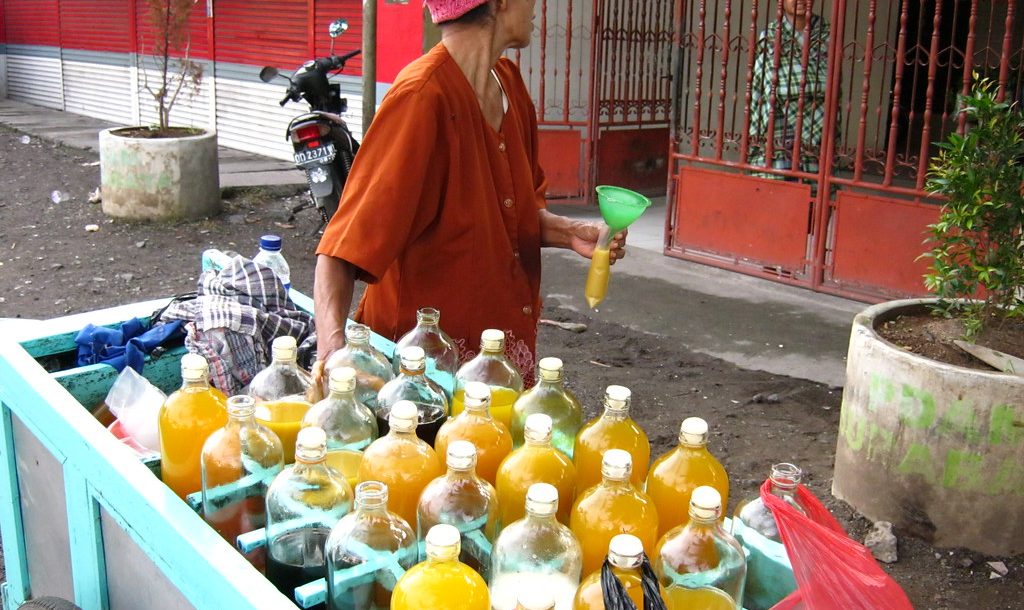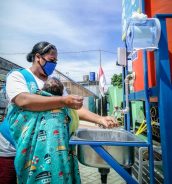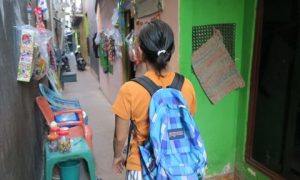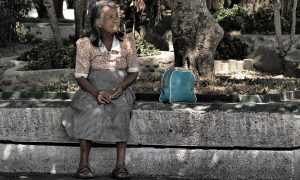While home has become the centre of human activity today, it is important to reflect on the different expectations that come from gender roles in a patriarchal society like Indonesia. Women are still expected to be responsible for the household and children’s education, and this burden has increased during pandemic. Interestingly, while they are fully in charge of the management of household, women have started to practice, even if unconsciously, the theory of ecofeminism—from their kitchens.
While news around the world has focused on rising domestic violence towards women and the added burden to their domestic duties, other impacts of the pandemic on women’s changing roles have become evident in Indonesian communities. This includes producing new knowledge based on their experiences in overcoming everyday problems during the pandemic. This knowledge has been aggregated and shared between communities (through social media or Whatsapp groups) leading to the formation of new values. As these values become part of the practices of the everyday, in many cases they lose their significance as “knowledge” and are seen as practical actions in the household and community. The institutionalization of knowledge, so familiar in the modern era, has created a system of singular truth which has for a long time ignored the importance of experiments and trials in knowledge production. Now we can see many women creatively experimenting with various economic and medicinal strategies, where they have started to combine indigenous knowledge and modern thinking.
Ecofeminism was introduced by Vandana Shiva to underline the importance of women’s roles in maintaining ecological complexity so humans can retain a high quality of life. There are many instances where women stand in the front-line of environment struggles against the rapid development and industrialisation that destroys forests and farms. But the COVID-19 outbreak has also been an eye-opening moment in which many Indonesian women have begun to protect the planet from within their own domestic territory. As well as waste management and food-resilience through urban farming, women have also created sisterhood circles in ordered to be more productive and socially engaged. These have turned into solidarity movements and circular economies that help families survive.
I myself have had a very different way of living during pandemic. I got married in February, and yes, suddenly COVID-19 spread and we’ve had to stay home most of time. I had started the construction of a new studio for small exhibition or performances, and some-how we needed to finish it in May. But since we were out of funds, we cancelled our plans to build and instead I started to use the rest of the land to grow vegetables and fruit. March is the end of rainy season in Indonesia and it is one of the best periods to grow tomatoes, egg plants and chilli. I used the plastic coffee packaging I’ve been collecting for two years for growing seeds.
Starting in January, I also committed to myself to reducing our contribution to waste, including organic waste. We created a home composter, and re-used all our plastic packaging. Every month now we have one big bucket of solid compost soil that feeds the plants. These changes to our way of living had given me a very positive feeling, creating better world on a smaller scale. Now it has been 8 months since I’ve discarded trash and I feel so relieved! And the good news is, I’ve seen the same thing amongst many of my female friends. I have followed some of their activities in living closer to the environment; managing waste, planting food at home, and eating what they grow.
Endah SR is a mother of two involved in different activities related to arts and literature. She created her garden from nothing when she moved away from busy life in the city to a village area on the outskirts of Jogja. As I do, she also manages her household waste with a composter, and this is very useful for the plants. Endah grows not only vegetables, she also loves to grow flowers—particularly orchids. One of her dreams was cooking food for the family from their own surroundings, and the pandemic somehow became the momentum to make it happen.
With her parents staying with her due to the lockdown, Endah also began to learn how to make traditional herbal medicine. Lots of tamarind trees grow around her house, so her mother gathered the fallen fruit and combined it with turmeric to make jamu, a traditional Javanese herbal drink which is good for immunity and for pain relief during menstruation. Endah has used her time at home during the pandemic to learn more about this older knowledge, and to take care of her and her family’s bodies with more organic ingredients, moving away from toxic chemical products. She sells jamu through social media and other women have warmly welcomed her products. Endah feels that the bond between women has become stronger during the pandemic, as they support each other by buying handmade products.
This popularity of herbal medicine was one the earliest phenomena during the pandemic. Even traditional jamu sellers—older women from the community—began to sell “jamu corona” (corona herbal medicine) in traditional markets or warung.
I also met Nurul, a housewife from Semarang with a similar experience. Aside from reducing her use of plastic packages, she began to collect reusable plastic to be sent to the recycling centre and she asked mothers in her neighbourhood to join her. For her, this act was also an important lesson about the important of individual participation in the preservation of the environment for her children. Now she sees that her children have a sense of awareness about the impact of human consumption, and have even start to consider packaging when purchasing items.
As well as making changes in the domestic arena, women in Indonesia have expanded their roles on wider social scale. In the kampung where my mother lives in Yogyakarta, mothers have joined forces to provide free food for the community. They buy extra food on their usual shopping trip and share the additional food in a public corner, where inviting people and families in need to take whatever they need. Others cooks together and share the food with becak drivers, or homeless people who have struggled economically because of the lockdown. More visible movements, such as Solidaritas Pangan Jogja (SPJ) is a collective initiative that gathers some communities—activists, journalists, artists, and others who wanted to help others in solving the hunger problem. Two of these are Dapur Ngadiwinatan and Dapur Sembungan (initiated by younger generation of artists/activists). Dapur Ngadiwinatan was initiated by a group of women activists including renowned feminist Ita Fatia Nadia and her two daughters, Syafiatudina and Khairunnisa), and others. The family used their own kitchen to start cooking for those who needed support due to the economic slowdown. Collecting funds from individuals who wanted to contribute to social solidarity movements, they gave away 200 to 300 rice packages (nasi bungkus) every day. They were even sent vegetables and spices by farmers in Kulon Progo who were recently evicted from their farming land to make way for Yogyakarta’s new airport. The public kitchen lasted for three months until the government established plans for a social security system.
Dapur Sembungan was mostly initiated by the members of Ruang Gulma collective—one of most progressive new art groups in Yogyakarta—with same spirit to provide very basic needs, food or vitamins—to people who lost their jobs or incomes because of the outbreak. Vivi, one of the members of this group, told me that with activities needing to be reduced to avoid crowds, members of Ruang Gulma wanted to maintain their space in a way that is useful for others. They had very little cash of their own, but they tried to collect donations in different ways, either money or materials that they could use for cooking. Recently the members of the group itself began to use their backyard to grow foods such as cassava, papaya, vegetables and others. The kitchen is still in operation now, although food is no longer distributed everyday, but rather three times a week.
The kitchen has become important meeting point and has grown into a centre of social solidarity during the pandemic. We might even say that in smaller communities, the people’s solidarity works faster and better than state interventions. In the absence of government responsiveness, communities have worked to solve problems instead of demanding their rights as citizens.
In the past, this solidarity might have appeared in the maternal collectives that were established during New Order era through the Program Kesejahteraan Keluarga (Family Well-being Program – PKK). Despite being highly criticized for its depoliticisation of the women’s movement, PKK had created a tradition of social solidarity and mutual care through programs such as Posyandu (maternal and child health cooperatives) and programs for the elderly, and even collectively visiting the sick in hospital. Indeed, depoliticisation did erase the more progressive role of women organisations, but on the other hand this New Order policy raised a higher sense of belonging among women in neighbourhoods. During periods of crisis such as we are in now, this sense of belonging and caring for each other in an intimate way has become part of the survival tools for the community.
While many men lost their jobs—particularly those working in entertainment, tours and travel or tourism—mothers began to sell whatever they can make for the survival of the family. Many women have begun to sell their home cooking—especially during Ramadhan—and this had been a great help for family. Instead of buying from big restaurants, women have supported each other by buying products from their inner circle, keeping the economy alive.
Collectively, these actions by women in different places could create impactful change in our planet. If done continuously and on a large scale, environmental and social-economic problems around waste management could be reduced significantly.
Gendering Indonesia’s responses to COVID-19: Preliminary thoughts
The approach used in the creation of these policies ignores that women may face more difficulty in accessing the promised benefits.
Even while women were burdened with home schooling children and providing food for the whole family they have also contributed to positive change in the world. Isn’t this amazing? As Vandana Shiva put it, women’s decisions in their local environment and households are significant responses to the way civilisation evolves. Women create knowledge through different experiences encountered in their everyday survival tactics. Many of the cases of ecofeminism in Shiva’s texts refer to women who live in indigenous villages. But we must also think how these acts of maintenance could be part of the life of urban or rural women. How can we transform our awareness into modern life, collectively?
I’ve observed that during the pandemic women quickly adapt to new situations and make the most of it, not only for the benefit of themselves and their families, but also for the wider community. It is time to reclaim the role of women as the foundation of this knowledge production, the frontline for of families and communities. And instead of this being seen as domestic, we need to elevate it as political action. Since the beginning of the women’s movement we have believed that the personal is political. The meaning of being personal and political is continuously shifting, always seeking a new definition that is relevant and contextual. In this time of crisis, the personal and domestic actions of women (particularly those that occur organically as collective movements) should be seen within this political perspective. This social revolution begins in the kitchen and is imperative for the resistance and resilience of our communities today, and furthermore, for the future of our planet!
 Facebook
Facebook  Twitter
Twitter  Soundcloud
Soundcloud  Youtube
Youtube  Rss
Rss 



